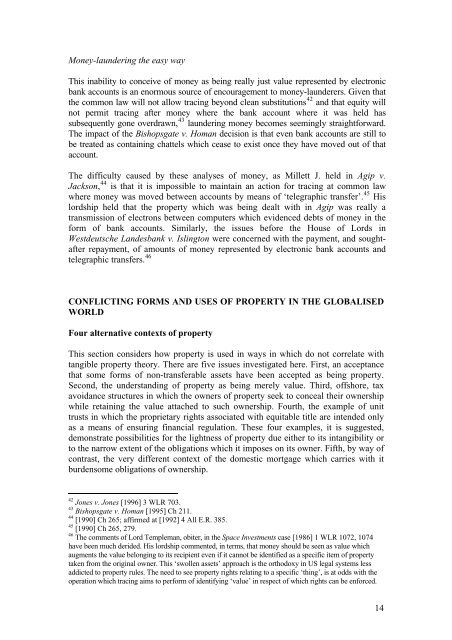The Unbearable Lightness of Property - alastairhudson.com
The Unbearable Lightness of Property - alastairhudson.com
The Unbearable Lightness of Property - alastairhudson.com
Create successful ePaper yourself
Turn your PDF publications into a flip-book with our unique Google optimized e-Paper software.
Money-laundering the easy way<br />
This inability to conceive <strong>of</strong> money as being really just value represented by electronic<br />
bank accounts is an enormous source <strong>of</strong> encouragement to money-launderers. Given that<br />
the <strong>com</strong>mon law will not allow tracing beyond clean substitutions 42 and that equity will<br />
not permit tracing after money where the bank account where it was held has<br />
subsequently gone overdrawn, 43 laundering money be<strong>com</strong>es seemingly straightforward.<br />
<strong>The</strong> impact <strong>of</strong> the Bishopsgate v. Homan decision is that even bank accounts are still to<br />
be treated as containing chattels which cease to exist once they have moved out <strong>of</strong> that<br />
account.<br />
<strong>The</strong> difficulty caused by these analyses <strong>of</strong> money, as Millett J. held in Agip v.<br />
Jackson, 44 is that it is impossible to maintain an action for tracing at <strong>com</strong>mon law<br />
where money was moved between accounts by means <strong>of</strong> ‘telegraphic transfer’. 45 His<br />
lordship held that the property which was being dealt with in Agip was really a<br />
transmission <strong>of</strong> electrons between <strong>com</strong>puters which evidenced debts <strong>of</strong> money in the<br />
form <strong>of</strong> bank accounts. Similarly, the issues before the House <strong>of</strong> Lords in<br />
Westdeutsche Landesbank v. Islington were concerned with the payment, and soughtafter<br />
repayment, <strong>of</strong> amounts <strong>of</strong> money represented by electronic bank accounts and<br />
telegraphic transfers. 46<br />
CONFLICTING FORMS AND USES OF PROPERTY IN THE GLOBALISED<br />
WORLD<br />
Four alternative contexts <strong>of</strong> property<br />
This section considers how property is used in ways in which do not correlate with<br />
tangible property theory. <strong>The</strong>re are five issues investigated here. First, an acceptance<br />
that some forms <strong>of</strong> non-transferable assets have been accepted as being property.<br />
Second, the understanding <strong>of</strong> property as being merely value. Third, <strong>of</strong>fshore, tax<br />
avoidance structures in which the owners <strong>of</strong> property seek to conceal their ownership<br />
while retaining the value attached to such ownership. Fourth, the example <strong>of</strong> unit<br />
trusts in which the proprietary rights associated with equitable title are intended only<br />
as a means <strong>of</strong> ensuring financial regulation. <strong>The</strong>se four examples, it is suggested,<br />
demonstrate possibilities for the lightness <strong>of</strong> property due either to its intangibility or<br />
to the narrow extent <strong>of</strong> the obligations which it imposes on its owner. Fifth, by way <strong>of</strong><br />
contrast, the very different context <strong>of</strong> the domestic mortgage which carries with it<br />
burdensome obligations <strong>of</strong> ownership.<br />
42 Jones v. Jones [1996] 3 WLR 703.<br />
43 Bishopsgate v. Homan [1995] Ch 211.<br />
44 [1990] Ch 265; affirmed at [1992] 4 All E.R. 385.<br />
45 [1990] Ch 265, 279.<br />
46 <strong>The</strong> <strong>com</strong>ments <strong>of</strong> Lord Templeman, obiter, in the Space Investments case [1986] 1 WLR 1072, 1074<br />
have been much derided. His lordship <strong>com</strong>mented, in terms, that money should be seen as value which<br />
augments the value belonging to its recipient even if it cannot be identified as a specific item <strong>of</strong> property<br />
taken from the original owner. This ‘swollen assets’ approach is the orthodoxy in US legal systems less<br />
addicted to property rules. <strong>The</strong> need to see property rights relating to a specific ‘thing’, is at odds with the<br />
operation which tracing aims to perform <strong>of</strong> identifying ‘value’ in respect <strong>of</strong> which rights can be enforced.<br />
14













